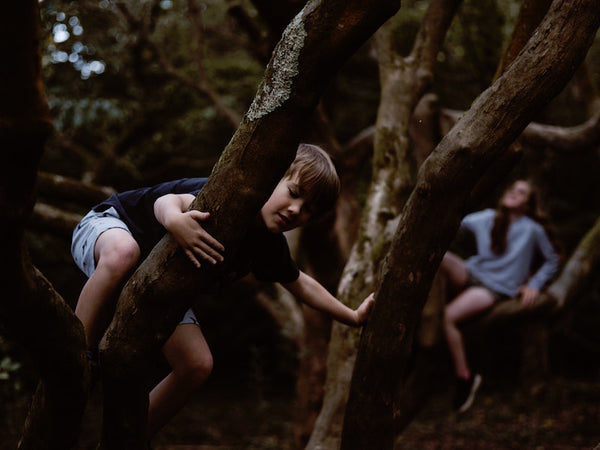Did you know there are more and more studies that suggest simply spending time outside or in green spaces can improve our health - both mentally and physically? As people who love being outside and have made outdoor lifestyles part of our career, we’ve always understood that feeling for ourselves, but it’s still nice to have science back up our instinctive feelings.
To paraphrase the study, researchers from Aarhus University in Denmark recently published yet another study about the outside ~ good health connection that we all know so well. The suggested that getting outside, walking around, hearing the rustle of trees, feeling the wind on our face, the rain on our backs, the sun on our skin is not only just “good” for us like we’ve always been taught to believe, but the more we do that as kids, the happier we are as adults.
For example, from 1985 until 2013, the researchers combed data from one million Danish residents. They looked at everything from income to educational level, history of familial mental illness, as well as how much green space surrounded where the residents had grown up. Because they had so much data to work with, the researchers were able to try and control for socioeconomic factors—kids who grow up wealthier probably have more access to green space, for example. Yet even factoring those discrepancies in, researchers found that growing up surrounded by nature as a child meant a 55% less chance of developing mental health issues as adults. Even more, it seemed that the more time children spent in nature, the better as far as mental health outcomes were concerned.

Photo by Annie Spratt
The researchers were able to use satellite data to examine how much green space surrounded the residences of the subjects in the study. It was as simple as noting that kids who grew up in areas surrounded by more visible nature meant better mental health outcomes as adults. Wilderness, public parks, even urban green spaces, it didn’t seem to matter. What we hear is that this finding could be very influential for future city and regional planning.
“There is increasing evidence that the natural environment plays a larger role for mental health than previously thought,” said Kristine Engemann, who led the study. “Green space seemed to have an association that was similar in strength to other known influences on mental health, like history of mental health disorders in the family, or socioeconomic status.”
What the study can’t show, however, is why this should be the case. Is it simple proximity to trees and vegetation? Or is it likely that kids who had access to more natural environments were more likely to be outside, getting exercise, perhaps doing so in groups and forming strong social bonds that they carried with themselves to adulthood? Maybe spending time in nature taught self-reliance, resilience, patience…
Or could it be that something in nature speaks to us in a way that won’t show up on a scientific study? We’ve heard that doctors are prescribing nature walks for patients to help with chronic physical ailments, that mountain biking groups are healing mental illness sufferers, and that surfing is a salvation for veterans with severe PTSD and physical ailments. The list and personal experiences an go on and on, really. It probably shouldn’t be so surprising that growing up in a natural environment would also have powerful health benefits.
Perhaps there’s simply a real physiological connection to being more in tune with the natural world. It’s certainly something we feel when camping, when floating in the ocean, when scaling a mountain peak, or even when lounging next to a lake.
“If we were talking about a new medicine that had this kind of effect the buzz would be huge,” said Kelly Lambert, a neuroscientist at the University of Richmond. “But these results suggest that being able to go for a walk in the park as a kid is just as impactful.”
Here at the Trail Shop, we're so lucky to be in a province that has green space all around; from our parks, to our beaches, to our trails, farmlands, and beyond.
We also want to note that this doesn't mean that you need to move so that when you open your doors you're in the middle of trees (though don't let us stop you!), but instead, to simply spend more time amongst them. Can we find a balance between the concrete and the mud; between the fast-paced noise and the serene earth?
- - -
Some of this article was originally written by Justin Housman - Adventure Journal









Leave a comment